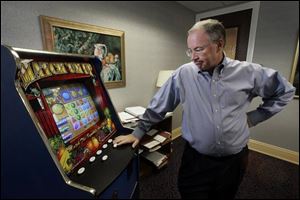
Electronic games of skill targeted by Strickland
6/13/2007
Lawyer David A. Kopech represents the gambling manufacturer Castle King LLC, which makes the Match 'Um Up game. Governor Strickland is trying to clamp down on gambling in Ohio.
COLUMBUS - Gov. Ted Strickland yesterday called on lawmakers to ban cash payouts from so-called electronic "games of skill" that proliferate in bars and taverns across the state.
He also vowed to veto a bill recently passed overwhelmingly by the Ohio Senate to allow Toledo's Raceway Park and six other tracks to install video horse-racing machines that critics claim look a lot like slot machines. The bill is pending in the House.
"It is obvious to me and I think to growing numbers of Ohioans that what we are seeing is an attempt to circumvent the will of the voters," said Mr. Strickland, referring to last November's vote rejecting slot machines for the tracks and two stand-alone Cleveland sites.
Attorney General Marc Dann said he has reversed course on his recently announced plan to conduct a thorough review of machines at the request of manufacturers to determine whether games like Match 'Um Up and Tic-Tac Fruit are legal games of skill or illegal games of chance.
The two Democrats' proposed legislation would not directly outlaw such machines, but would forbid them from paying out cash or providing vouchers that could be exchanged for cash.
Instead, the machines could offer vouchers for goods valued at up to $10 per game and accumulating to no more than $600 over the course of a year. The prizes may not include alcohol, firearms, tobacco, lottery tickets, or vouchers toward other forms of gambling.
Mr. Dann said that would make enforcement of the law easier for local chiefs of police and sheriffs.
"Rather than focusing on whether these machines are games of skill or games of chance, we are going to be in a much better position to prove or win cases in the criminal courts if we simply ban cash payouts," he said. "If they're paying cash, it's illegal."
It would also presumably reduce some of the attraction to machines that critics have called a cousin to slot machines.
"If there's no market, there's no crime," said Mr. Dann.
Supporters of the instant horse-racing machines have argued that they're necessary to bolster a struggling racing industry and the agricultural business dependent upon it.
"I have not seen the machine," said Jerry Chabler of Sylvania, whom Mr. Strickland recently appointed to the Ohio State Racing Commission.
"It's the governor's decision to veto it, and we'll have to find some other way to enhance an industry that is pretty much on life support," he said. "The racetrack owners are going to have to come up with a way to build a better mousetrap."
Sen. Steve Stivers (R., Columbus), sponsor of the instant horse-racing bill, said he is willing to add a prohibition on cash payouts on the so-called games of skill, but he objects to including a similar restriction on the instant race machines.
"The instant race is a horse race at a racetrack," he said. "It's no different from simulcast races except it's not live. I would add that if we're not careful on what the governor has proposed, you could put simulcast racing in Ohio in jeopardy, because clearly that is an electronic device that runs that race. It's not run in Ohio. It's run over the airwaves via electronic devices."
The instant race machines, now in use in Arkansas and Oregon, call upon a database of some 300,000 previously run races and allow a bettor to use information provided on horses, jockeys, and trainers to bet on anonymous, randomly selected races.
The bettor then watches a video replay of that old race or fast forwards to the last 10 seconds. Only after the race is over does he learn which race he just bet on.
Contact Jim Provance at:
jprovance@theblade.com,
or 614-221-0496.